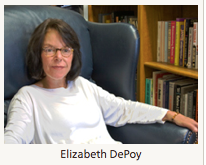Elizabeth DePoy, Ph.D.
M.S.W. University of Pennsylvania
Ph.D. University of Pennsylvania
Elizabeth DePoy is professor of social work, interdisciplinary disability studies, and cooperating faculty in Mechanical Engineering. She also holds an appointment as Senior Research Fellow. Ono Academic College, Research Institute for Health and Medical Professions. Kiryat Ono, Israel. A theorist and researcher, she is best known for her work in methods of inquiry, legitimacy theory and disjunture theory. Co-authored with Stephen Gilson, DePoy developed Explanatory Legitimacy Theory. Through that lens, DePoy analyzes how population group membership is assigned, is based on political purpose, and is met with formal responses that serve both intentionally and unintentionally to perpetuate segregation, economic status quo, and inter-group tension. Co-authored with Gilson, Disjuncture Theory explains disability as an interactive “ill-fit” between bodies (broadly defined) and environments (broadly defined). Most recently, DePoy has expanded her work to examine how impaired bodies illuminate values that challenge the boundaries of humanness.
Applying an interdisciplinary theoretical synthesis to healing disjuncture, DePoy has engaged in a collaborative research agenda with Gilson and Vince Caccese, applying engineering and robotic science to the creation of juncture. Her most recent innovations involve prototyping and testing service and fitness robotic devices and she is proposing to use social robotics to augment and render home-based health and human augmentation practices accessible to many who are currently excluded.
In her most recent writing in press, DePoy, with co-author Gilson, applies design and branding theories and practices to the analysis of diversity categories, their membership, and their maintenance. She asserts that current approaches to understanding and responding to diversity as essentialist categories are grand narratives that advantage the market and professional economy, and urges professionals to rethink and revise these conceptualizations if profound social change within a 21st century global context is to be accomplished.

